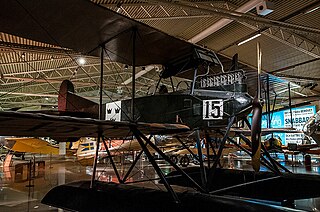Related Research Articles

The FFVS J 22 was a Swedish single-engine fighter aircraft developed for the Swedish Air Force during World War II.

The Thulin LA was a Swedish two-seat, single-engine biplane designed by Enoch Thulin in 1917 and made by his company AB Thulinverken in Landskrona. It was based on the earlier Thulin L and E aircraft, with a new engine, fuselage and empennage. The L and E types were in turn based on the German Albatros B.II aircraft, like the NAB Albatros. The Thulin LA was used in Sweden, the Netherlands (10) and Finland (1). This type also made the first passenger transport flights between Sweden and Denmark in 1919. Altogether there were 15 Thulin LAs built.

The Heinkel HD 42 50, later designated the Heinkel He 42 was a German two-seat biplane seaplane originally designed for the Deutsche Verkehrsfliegerschule, and later built for the German Luftwaffe. The aircraft was used until the end of World War II as a trainer for maritime pilots.

The Zlín Z-XII was a Czechoslovak two-seat sports aircraft, and the first major design success by the Zlínská Letecká Akciová Společnost (Zlín) aircraft manufacturing company, after its founding in Otrokovice after the takeover by the Bata Group.
The Boeing Model 7, a.k.a. Boeing BB-1 was an American biplane flying boat aircraft built by Boeing in the 1920s. The pilot and two passengers all sat in the cockpit, the passengers right behind the pilot.
The Boeing Model 8, a.k.a. BB-L6, was an American biplane aircraft designed by Boeing specifically for their test pilot, Herb Munter.

The Boeing L-15 Scout or YL-15 was a small, piston engine liaison aircraft built by Boeing in very small numbers after World War II. It was a short take-off and landing (STOL) aircraft powered by a 125 hp Lycoming engine. The L-15 was an attempt by Boeing to expand its product line as World War II drew to a close, and Boeing's production of combat aircraft declined. Boeing decided against marketing the L-15 as a general aviation aircraft, and the twelve that were produced went to the United States Army for testing, then were transferred to the United States Fish and Wildlife Service in Alaska for various duties.
The Thulin K was a Swedish naval fighter aircraft in the 1910s. It was operated by both the Swedish and Dutch armed forces.

The DFS Kranich is a type of German glider. It was developed by Hans Jacobs for the Deutsche Forschungsanstalt für Segelflug (DFS).

The Horten H.III was a flying wing sailplane built by Walter and Reimar Horten in Germany from 1937 to 1944.

The FVM Ö 1 Tummelisa is a single seat, single engine Swedish biplane from the 1920s. It was operated by the Swedish Air Force as its advanced trainer until the mid-1930s.

The Spijker V.2, sometimes anglicized to Spyker V.2 or Spyker-Trompenburg V.2, was a low powered, tandem seat biplane designed and built for the Dutch government for pilot training towards the end of World War I. More than seventy were built.

The Spijker, Spyker V.1 or Spyker-Trompenburg V.1, was a single seat biplane fighter built in the Netherlands during World War I. It was underpowered and did not go into production.

The Thulin G was a Swedish military reconnaissance aircraft built in the late 1910s.
The Nihon L7P was a Japanese military seaplane built in World War II in the early 1940s.

The Thulin NA was a prototype Swedish fighter plane built in the late 1910s.
The Thulin N was a prototype Swedish scout aircraft built in the late 1910s.
The Thulin H was a Swedish reconnaissance/bomber plane built in the late 1910s.

The Thulin E was a Swedish reconnaissance aircraft built in the late 1910s.

The Thulin FA was a Swedish reconnaissance aircraft built in the late 1910s.
References
- ↑ "Thulin L". www.airwar.ru (in Russian). Retrieved 1 March 2019.